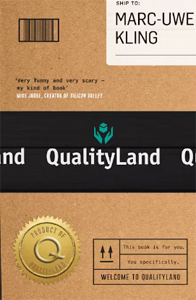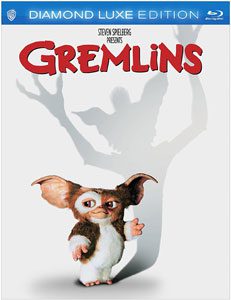Satire that makes fun of government, corporatism and an increasingly mind-numbed citizenry becomes harder to do as real-world developments come close to obliterating the line between humorous overstatement and blunt extrapolation. So it is that Marc-Uwe Kling’s “QualityLand” (2017) sometimes is part of a tradition with George Orwell’s “1984,” and other times with Michael Crichton, but mostly with Mike Judge’s “Idiocracy.”
German author Kling is mostly interested in making fun of and warning about how metadata gathering will take decision-making away from individuals. This was explored soberly on TV’s “Westworld,” and with more dry, dark humor here. The audience surrogate is Peter Jobless; people’s last names come from the job of their parent with the same gender, similar to Max Barry’s “Jennifer Government” (2002), where people take the last name of their own vocation.
Quick-hit humor comes from simply seeing characters’ names, like Melissa Sex-Worker. Sometimes Kling’s jokes land with a thud, like when Peter’s wise off-the-grid mentor likes to quote “Star Wars.” (Granted, it is amusing that Peter shines a light on the odd trait, noting that the man hated the last 18 “Star Wars” films.)

“QualityLand” (2017)
Author: Marc-Uwe Kling
Genre: Science fiction
Setting: Near future in a country (probably Germany) rebranded as QualityLand
Note to readers: The Book Club Book Report series features books I’m reading for my book club, Brilliant Bookworms.
The most enjoyable elements of “QualityLand” are the light jokes, like when we learn that Jennifer Aniston rom-coms are wildly popular in this future; she had herself cryo-frozen at some point and is still making them.
Blurry satire about the blurry singularity
Peter is a Phildickian Sad Sack who makes ends meet by recycling defunct electronics; he’s hovering at Level 10 (out of the 100-point rating scale of citizens), just one level above being a Useless. But thanks to a legal loophole, he doesn’t have to mash up the computers and robots immediately, so he keeps several around as friends.
Fitting the SF tradition, the robots are more human than the humans: These artificial beings have huge personalities and even bigger psychological issues. Humans make AI, then AI makes the next generation of AI and so forth. Eventually no living being knows how the AI was originally programmed, so glitches are indistinguishable from humans’ psychological problems, which scientists in the real world are currently bumbling toward learning about.
Kling is originally clunky in his world-building. But once we know the political setup, it allows for more gags such as the fact that QualityLand’s taxpayers pay for weapons for both their own soldiers and the enemy’s, in order to keep the war going. This is on-point, but also it’s close to what the USA does in reality (the government gives money to both Israel and Palestine, which are warring with each other). So we get satire that’s so blurred with reality we can’t really laugh.
The point is well-taken, though, that human society is progressing (regressing?) to a point where you can’t even return a falsely delivered product because the one remaining monopolistic corporation is too powerful to be bothered with you.
The product in this case is a pink dolphin-shaped vibrator (tee-hee), the last straw for Peter, who has gradually morphed from pathetic/passive to sympathetic/active. Peter aims for the impossible: a meeting with the CEO of the uber-Amazon-type corporation. It’s like trying to meet the Architect in “The Matrix.”
A blunter ‘Simulacra’
Kling stumbles with his creation of John of Us, a modern liberal robot running for president against a modern conservative hatemonger. In a section where John of Us argues for universal basic income, saying it’s fine to print money to cover it, it reads flatly, like the author is not trying to be funny.
I’m pretty sure he’s expressing his actual political view here, which is surprising considering Germany is famous for the collapse of its currency after World War II, leading to the classic anecdote of people needing a wheelbarrow full of money to buy a carton of milk.
The political storyline calls to mind Philip K. Dick’s 1964 novel “The Simulacra,” also featuring a robot politician. But Kling’s attempt to have one of the candidates be totally sober-minded keeps the novel from accelerating to that next level of absurdity.
In a line-by-line fashion, Kling isn’t as gleefully funny as PKD despite hitting touchstones liking talking doors, talking cars and a news program that’s a ratings hit because the hostess is nude. While the author is aiming for a wild romp – as indicated by side trips that show posting-board comments in this predictably brainless future of human drones – Kling has mapped things out bluntly.
The author understands the problem, so “QualityLand” can’t be dismissed. But John of Us’s proposed solution is just another problem, or at best a rearranging of the deck chairs on the Titanic. Knowing that Kling believes more money-printing is the first step to creating a better world blunts the satire’s otherwise pointed edge.


